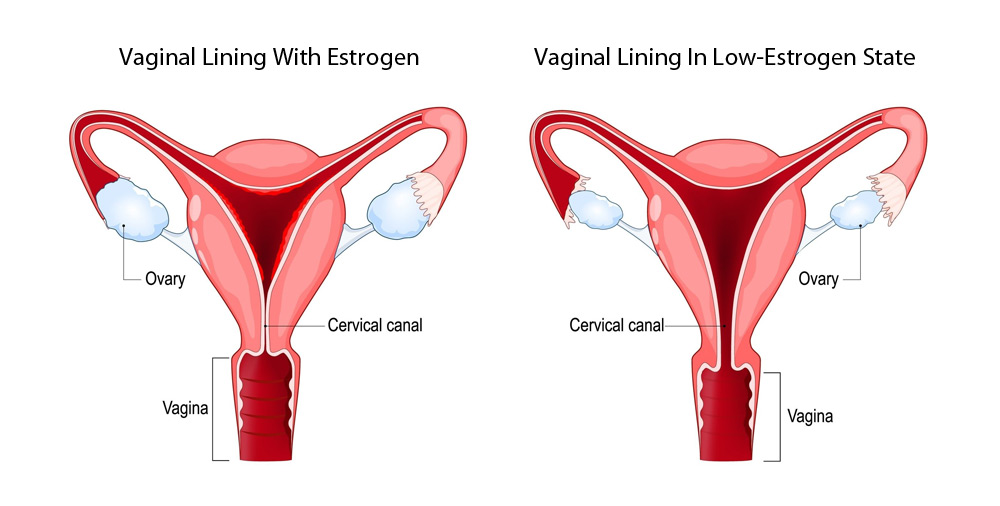Did you know that roughly 19% of women experience vaginal dryness between the ages of 42 and 53 years, increasing to 34% between 57 and 69?1
Vaginal dryness is a common symptom of menopause but not a well-known one. Around 50% of women experiencing dryness do not report this issue to their health care provider.
This dryness has led to women expressing concerns about painful intercourse, loss of libido, increased risk of urinary tract infections, and more,2 making it an important issue needing attention.
More recently, women have sought help from holistic therapies to help alleviate this dryness. Of these holistic approaches, sea buckthorn supplementation has proven quite popular.
So, what’s the main cause of dryness?
Vaginal dryness, in relation to menopause, is often caused by vaginal atrophy, where the vaginal walls get thinner and drier. This happens because of the decline of estrogen, a hormone that helps to retain moisture and vaginal function and helps to maintain the thickness and flexibility of the vaginal wall (see image). This decline of estrogen may lead to other complications such as vaginal discomfort, painful intercourse, low libido, and an overall decrease in sense of well-being.3
FIND OUT MORE ABOUT OMEGA 7 >
How can we manage the dryness?
 Topical treatments are commonly recommended by health professionals to support vaginal dryness. Nowadays, more holistic methods are becoming increasingly popular amongst women, such as nutrition, lifestyle, and supplementation. A popular supplement used amongst menopausal women for dryness is Omega 7 sea buckthorn oil, sourced from the berries and seeds of the sea buckthorn plant.
Topical treatments are commonly recommended by health professionals to support vaginal dryness. Nowadays, more holistic methods are becoming increasingly popular amongst women, such as nutrition, lifestyle, and supplementation. A popular supplement used amongst menopausal women for dryness is Omega 7 sea buckthorn oil, sourced from the berries and seeds of the sea buckthorn plant.
These berries are also rich in various vitamins, including vitamin A. Vitamin A helps to maintain the health of our mucous membranes4 - a key factor in vaginal moisture!
What does the research say?
A 2014 study explored sea buckthorn oil on 116 postmenopausal women experiencing vaginal dryness. This three-month trial looking into vaginal pH and moisture found improvements in vaginal health amongst these women.5 This trial used a specific formula called SBA24.
SBA24 is carefully extracted from both the seed and the berry of the sea buckthorn plant using an effective process known as 'supercritical fluid extraction’. This process protects the sea buckthorn from temperature damage and oxidation.
It is also a clean and environmentally friendly process, providing no waste or use of harsh chemicals.

So, all in all, if you are around menopausal age (even if you’re not) and are experiencing vaginal dryness, then omega-7 could be a supplement worth considering.
References
1. Waetjen LE, Crawford SL, Chang PY, et al. Factors associated with developing vaginal dryness symptoms in women transitioning through menopause: a longitudinal study. Menopause. 2018;25(10):1094-1104. doi:10.1097/GME.0000000000001130
2. Faubion SS, Sood R, Kapoor E. Genitourinary Syndrome of Menopause: Management Strategies for the Clinician. Mayo Clin Proc. 2017;92(12):1842-1849. doi:10.1016/j.mayocp.2017.08.019
3. Kingsberg S, Wysocki S, Magnus L, Krychman M. Vulvar and Vaginal Atrophy in Postmenopausal Women: Findings from the REVIVE (REal Women's VIews of Treatment Options for Menopausal Vaginal ChangEs) Survey. J Sex Med. 2013;10(7):1790-1799. doi:10.1111/jsm.12190
4. Zielińska A, Nowak I. Abundance of active ingredients in sea-buckthorn oil. Lipids Health Dis. 2017;16(1):95. Published 2017 May 19. doi:10.1186/s12944-017-0469-7
5. Larmo PS, Yang B, Hyssälä J, Kallio HP, Erkkola R. Effects of sea buckthorn oil intake on vaginal atrophy in postmenopausal women: a randomized, double-blind, placebo-controlled study. Maturitas. 2014;79(3):316-321. doi:10.1016/j.maturitas.2014.07.010

